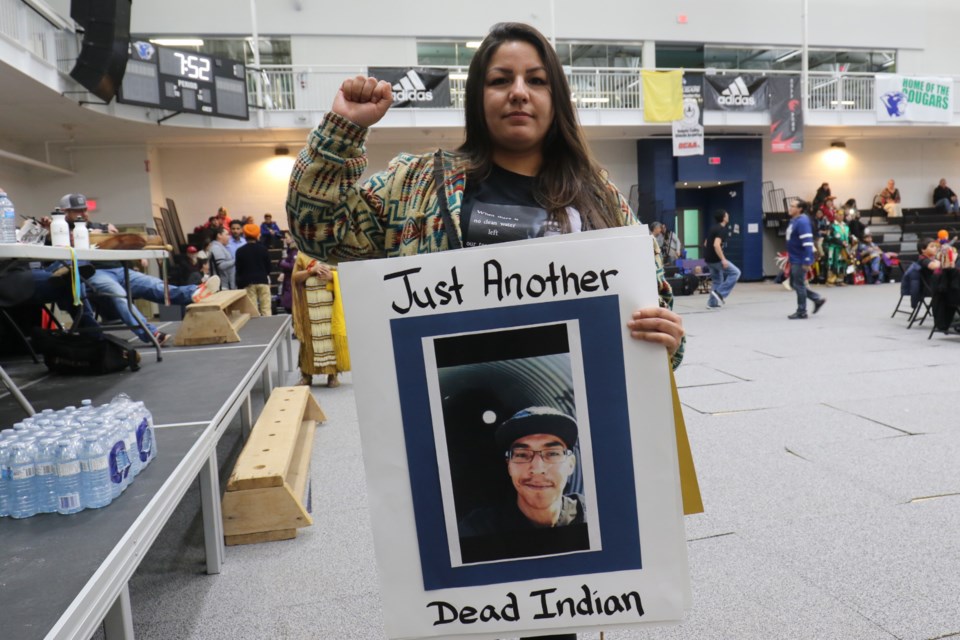Candace Day Neveau, a co-founder of the Bawating Water Protectors, spoke out against Canada’s nuclear waste disposal policies at the United Nations in New York City last week.
The local Anishinaabe activist was there as part of a working group, consisting of representatives from the Anishinabek Nation and the Iroquois Caucus.
“There’s a lot of nuclear waste that they don’t know what to do with, so they want to bury it in the ground, kind of ‘out of sight, out of mind’ kind of deal instead of properly dealing with it,” Day Neveau said. “The cheapest thing is just to bury it, and the scientists are telling us it’s the most irresponsible thing we can do to future generations.”
The latest proposal by the Nuclear Waste Management Organization (NWMO), said Day Neveau, is to bury nuclear waste in Ignace, Ont., a small town situated northwest of Thunder Bay.
Day Neveau says that similar proposals by the federal body in the past to bury nuclear waste along the shores of Lake Huron in Elliot Lake, Blind River and Bruce County were met with resistance by Indigenous groups, including the Anishinabek Nation.
“We pushed them out of this area, so now they’re heading up to Ignace,” she said.
Day Neveau has been working on raising awareness about the dangers of nuclear waste disposal, participating in tribunals and staging demonstrations.
The problem, she says, is the NWMO having the power to decide what’s safe and what isn’t.
“Jean Chretien had put together NWMO, because this is how long ago they projected these things happening,” Day Neveau said. “They’ve been working on this portfolio for the past 30 years to figure out the best spot to bury this stuff.”
The Anishinabek Nation, which represents 40 First Nations across Ontario, issued a joint declaration with the Iroquois Caucus in November 2017 decrying Canada’s nuclear energy policies.
In April, the Anishinabek Nation issued a press release condemning ongoing nuclear research activities at Chalk River Laboratories, a federally-run facility located between North Bay and Ottawa that’s situated along the Ottawa River.
“All other countries are decommissioning our nuclear reactors, but [in] Canada...Chalk River is investing in creating more nuclear energy,” she said.
Day Neveau says that while at the United Nations she heard that while nuclear energy production is on the downturn in other countries, Canada seems to be on the opposite end of the spectrum.
“We have too much of it now, and we don’t know what to do with it,” she said. “It’s really scary.”
Day Neveau is currently living in Nimkii Aazhibikong, a camp for Anishinaabe language and culture revitalization located north of Elliot Lake, where she’s currently homeschooling her two children.
She said that her children are at the root of her ongoing activism.
“For me personally, I’m a young mother and I’m deeply concerned about what the future’s going to be like for my children, and what legacy we’re leaving behind for them,” said Day Neveau. “I feel that as a Anishinaabe person, I have the right and responsibility to speak up and say something about this treatment of mother nature.”
She says that being born Indigenous, she was ‘pretty much born political,’ and feels that it’s her moral obligation to speak up about issues affecting Indigenous people when given a platform, such as the United Nations, in order to speak about the environmental dangers surrounding Canada’s nuclear energy policies on production, research and waste disposal.
“It was nerve wracking, but it’s something I feel like have to do,” Day Neveau said. “There’s no way of getting around it, if no one’s going to say something then I will.”
“It just feels like an honour to speak up for mother earth.”
